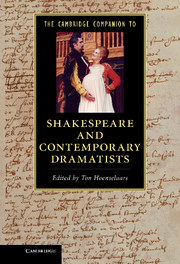Book contents
- Frontmatter
- Contents
- Illustrations
- Contributors
- Preface
- Chronology of the life and work of Shakespeare and contemporary dramatists
- 1 John Lyly and the University Wits
- 2 Thomas Kyd and the Elizabethan blockbuster
- 3 ‘The words of Mercury’
- 4 The dyer’s hand
- 5 Urbane John Marston
- 6 Thomas Dekker and the emergence of city comedy
- 7 Shakespeare
- 8 Thomas Heywood
- 9 George Chapman’s learned drama
- 10 Francis Beaumont and John Fletcher’s tragicomedy as musical melodrama
- 11 Thomas Middleton and the early modern theatre
- 12 John Webster
- 13 John Ford
- 14 Philip Massinger
- 15 Richard Brome and the idea of a Caroline theatre
- 16 Troublesome histories
- Select bibliography
- Index
- References
9 - George Chapman’s learned drama
Published online by Cambridge University Press: 05 December 2012
- Frontmatter
- Contents
- Illustrations
- Contributors
- Preface
- Chronology of the life and work of Shakespeare and contemporary dramatists
- 1 John Lyly and the University Wits
- 2 Thomas Kyd and the Elizabethan blockbuster
- 3 ‘The words of Mercury’
- 4 The dyer’s hand
- 5 Urbane John Marston
- 6 Thomas Dekker and the emergence of city comedy
- 7 Shakespeare
- 8 Thomas Heywood
- 9 George Chapman’s learned drama
- 10 Francis Beaumont and John Fletcher’s tragicomedy as musical melodrama
- 11 Thomas Middleton and the early modern theatre
- 12 John Webster
- 13 John Ford
- 14 Philip Massinger
- 15 Richard Brome and the idea of a Caroline theatre
- 16 Troublesome histories
- Select bibliography
- Index
- References
Summary
George Chapman (1559/60–1634) was born in Hitchin, Hertfordshire, the younger son of a well-to-do farmer. His elder brother inherited the bulk of the estate, leaving George in financial trouble for much of his life. Little is known for certain about his youth. According to Anthony Wood, the Oxford antiquary, Chapman studied some years at Oxford University, excelled at the classics, but did not take a degree. The influence of classical literature is clear throughout his work, which is erudite and abounds with allusions to ancient culture and history. After university, Chapman seems to have spent some time in the service of a knight, Sir Ralph Sadler, probably in the early 1580s, before fighting the Spaniards in the Low Countries.
By 1594, Chapman had embarked on his literary career, with the publication of his poem The Shadow of Night, followed a year later by Ovid’s Banquet of Sense. His sequel to Marlowe’s Hero and Leander (1598) is one of his best-known poems. Chapman’s learned classical allusions, often ambiguous grammatical constructions and far-fetched conceits ally him with the Metaphysical style of wilful obscurity. His poetry, Chapman boasts, is written for ‘serching spirits, whom learning hath made noble, and nobilitie sacred’, not for ‘the prophane multitude’. Learning, to Chapman, is more than bookish knowledge: it implies an urbanity that ultimately serves a moral function, allowing the scholar to learn from the great classical philosophers. Some of this elitist attitude also permeates his dramatic work, in particular the tragedies. Even the comedies for the public theatres are often based on classical sources (All Fools reworks two comedies by Terence, and The Widow’s Tears dramatises Petronius’ Satyricon), contain Latin proverbs (‘Sine periculo friget lusus’ in All Fools), allusions to classical mythology, and unusual Latin stage directions such as ‘Abscondit se’ (he hides himself), ‘Amplectitur eam’ (he embraces her), and ‘Bibit Ancilla’ (the servant girl drinks).
- Type
- Chapter
- Information
- Publisher: Cambridge University PressPrint publication year: 2012
References
- 2
- Cited by

